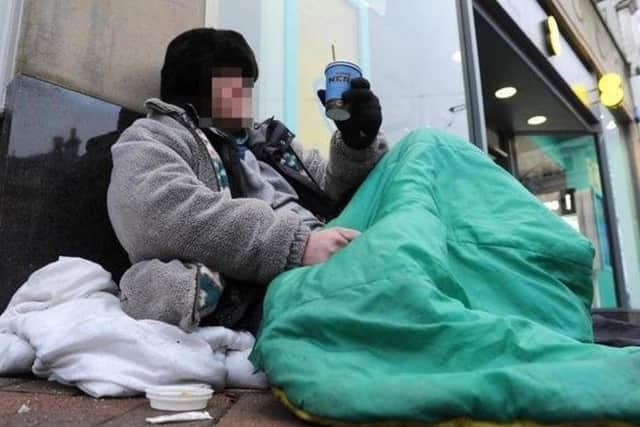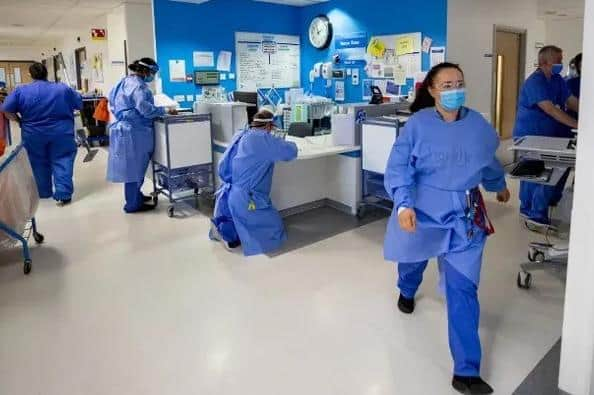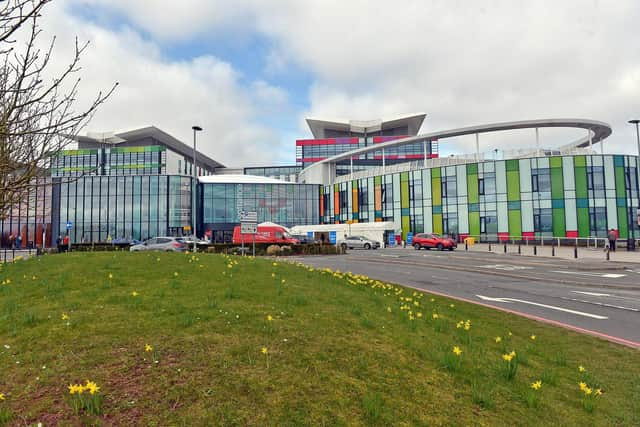Why health providers across Mansfield and Ashfield are working to cut the cost of homelessness and alcoholism
and live on Freeview channel 276
Charity Crisis said homelessness causes severe inequalities in care, with health issues often going untreated until a critical point.
Data shows roughly 775 emergency care admissions to SFH – which runs Sutton’s King’s Mill, Mansfield Community and Newark hospitals – had a diagnosis of ‘social problems, including chronic alcoholism and homelessness’ in 2020-21.
Advertisement
Hide AdAdvertisement
Hide AdIt cost the trust £343,910 to treat patients with this diagnosis over the period.


The number of admissions rose from roughly 770 the year before, and the cost increased from £204,706.
In 2018-19, the first year such figures were recorded, there were roughly 740 patients admitted with this diagnosis, at a cost of £182,000.
The figures also cover a range of other categories, including nutritional disorder, safeguarding abuse, social problems in schools and poor social circumstances, with the diagnosis made by the clinician responsible for the patient attending accident and emergency.
Advertisement
Hide AdAdvertisement
Hide AdA trust spokeswoman said: “We are continuing to work with partners to put a range of measures in place to help support vulnerable and homeless people in our area.


“SFH, with partners, runs a ‘Street Health’ service, which intensively supports particularly vulnerable or homeless service users.
“The A&E department also has dedicated nurses and doctors who specialise in psychiatry and can help patients who need this extra support with their mental health.
“We are committed to continuing to work to look at ways we can help vulnerable people, so they can access the healthcare and support they need, rather than going to emergency departments in the first instance.”
Advertisement
Hide AdAdvertisement
Hide AdMore than 50,500 patients were admitted to NHS hospitals, minor injury units and walk-in centres with similar issues across England last year, up from 48,300 the year before and 48,700 in 2018-19.


But the £21.1 million cost to the NHS jumped from £13.5m in 2019-20, and almost doubled from £11.8m just two years prior.
The Institute of Alcohol Studies said one explanation for this rise could be people with social problems in 2020-21 had more severe issues when they arrived at emergency departments.
An IAS spokesman said there were increases in higher risk drinking, alcohol liver disease emergency admissions and alcohol-specific deaths that year, but warned any trends during the pandemic are difficult to interpret.
Advertisement
Hide AdAdvertisement
Hide AdMatt Downie, Crisis chief executive, said something as simple as lack of ID can make going to a GP impossible for people experiencing homelessness, meaning health issues often are not addressed until critical.
In terms of cost, social problems was ranked 25th out of the 38 different types of emergency care diagnosis listed at SFH, which runs an A&E department at King’s Mill, alongside an urgent care centre at Newark.
It was responsible for just 1 per cent of the trust's £31.1 million total costs.
The highest amount was spent on treating patients with dislocation/fracture/joint injury/amputation, at £2.5 million, or 8 per cent of the total.
Advertisement
Hide AdAdvertisement
Hide AdThe Nottinghamshire Integrated Care System, which unites healthcare providers across the county to ‘coordinate services around the needs of each person’ says a range of measures are in place to help support vulnerable and homeless people in the area:
Community champions
The Ministry of Housing, Communities and Local Government set up the scheme during the pandemic to support communities at greater risk of Covid.
More than £23 million of funding was allocated to 60 councils and voluntary groups across England, including Mansfield, to expand work to support those most at risk from Covid-19 and boost vaccine take up.
Community champions draw on their local knowledge, skills, and life experience to promote health and wellbeing or improve conditions in their local community.
Advertisement
Hide AdAdvertisement
Hide AdThey address barriers to engagement and improve connections between services and disadvantaged communities.
Health and Wellbeing pop-ups
Health and wellbeing pop-ups have taken place in Mansfield and Ashfield.
These pop-ups include Covid testing, Covid vaccinations, blood pressure checks, support with signing up to a GP practice, signposting to the right NHS service and advice on local healthcare provision.
Registering with a GP and Rough Sleeper Initiative
A trust spokeswoman said: “We know sometimes people who are homeless can find it hard to register with a doctor and worry they will need ID or they will have to pay for prescriptions.
Advertisement
Hide AdAdvertisement
Hide Ad“We hope, by working closely with partners, we can help inform people, so they can get access to the healthcare they need.”
Social Prescribing
Work has been undertaken in local communities by social prescribing link workers, who can provide practice support on issues such as: mental health; debt management; health, housing; and health promotion activities connecting people and activates to help sustain and maintain a better quality of life.
A pilot is under way to look at social prescribing in emergency departments, to identify people using the emergency department to help them choose and access the right healthcare.
Patients will receive a robust plan of support, which may include support to register with their local GP surgery with the intention of preventing hospital admission and/or hospital re-attendance.
Advertisement
Hide AdAdvertisement
Hide AdHomelessness
A range of health, social care and housing professionals across Mansfield and Ashfield are currently working together to improve the health and wellbeing of homeless/rough sleeping communities through various initiatives such as outreach nursing who provide wound care services and support.
Rosewood Primary Care Network – which includes Churchside Medical Practice, Forest Medical, Roundwood Surgery, Mill View Surgery and The Acorn Medical Practice, in Mansfield – has developed an approach to Severe Multiple Disadvantage, to which homelessness is a feature.
The PCN aims to ensure people experiencing SMD are able to access primary care services, which is proving helpful to individuals and helping reduce inappropriate A&E attendances and secondary care admissions.
